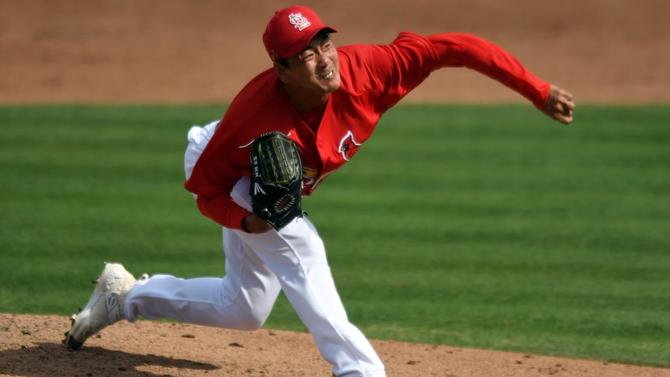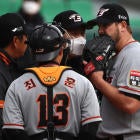Major League Baseball was supposed to launch its regular season in March. But the spread of the novel coronavirus forced the league to delay Opening Day until later in the year, with the exact date still to be determined. If there is good news for seamheads, it's that another league is about to resume play. The Korea Baseball Organization (KBO), described before as delivering the "wildest, most outlandish" version of the sport, kicked off its season on Tuesday.
KBO teams will play a full 144-game schedule, but if a player or coach is infected with COVID-19, the league will be shut down for three weeks minimum. There will not be fans in attendance, at least to start the season.
Most Americans fans are too preoccupied with MLB to concern themselves with foreign leagues, be it KBO or Japan's top league, Nippon Professional Baseball. That could change now if KBO is the only game in town. As such, we put together the following primer to help educate everyone about the ins and outs of the KBO.
How many teams are in the KBO?
There are 10 active teams. The Doosan Bears, Kia Tigers, LG Twins, Lotte Giants, and Samsung Lions are the oldest clubs, each having been founded in 1982. The newest teams are the KT Wiz (2015), NC Dinos (2013), and Kiwoom Heroes (2008). The Hanwa Eagles and SK Wyverns round out the group.
As you probably noticed, the teams are not named for their geographical locations. While that's a departure from MLB norms, it does help differentiate the three teams that share Seoul, South Korea's capital city: the Bears, the Heroes, and the Twins. For those curious, the Eagles play in Daejeon, the Tigers in Gwangju, the Wiz in Suwon, the Giants in Busan, the Dinos in Changwon, the Lions in Daegu, and the Wyverns in Incheon.
What is the season structure of KBO?
Every KBO team plays a 144-game season. Because KBO uses a balanced schedule, each team plays the other nine an equal 16 times. That is a departure from MLB, in which teams play within their division more often and don't play everyone else. KBO, despite starting its season later than intended, still hopes to play a full 144-game slate.
How about the playoffs?
Because KBO has fewer teams, the playoff structure is different from MLB's as well. The top five squads qualify for the postseason, with the top overall team receiving a pass to the best-of-seven championship series, otherwise known as the Korean Series.
Before the Korean Series can begin, the No. 4 and No. 5 teams play in a best-of-three (sort of) Wild Card series. The catch is that the No. 5 team starts in an 0-1 hole, permitting the No. 4 team to advance with a single victory or tie (yes, the KBO allows ties, even in the playoffs).
The Wild Card winner advances to play the No. 3 team in a best-of-five series, with that winner then playing the No. 2 team in another best-of-five series.
In other words, there is a greater emphasis placed on the regular-season results.
Who are the best teams?
The Doosan Bears have been the most dominant team in the KBO in recent times. The Bears won the 2019 Korean Series, their third title in five years, and they finished as the runners-up in the other two years. Their 22 postseason appearances are the second most among KBO franchises, behind only the Samsung Lions.
The Lions (eight) and Bears (six) have the second and third most championships to their name. The team with the most, or the KBO equivalent of the New York Yankees, is the Kia Tigers, who have won 11 titles. Five of those came during the '80s, and only one (2017) since 2010.
How can I watch?
ESPN and KBO agreed to a deal where one game per day will air on the American network. That means six games per week since KBO doesn't typically play on Mondays. Here is ESPN's broadcast schedule for the first week, with game times in the early morning hours on the east coast.
ESPN will air six KBO games per week. Here's the schedule for this week! pic.twitter.com/QB0mb9srDZ
— Jared Diamond (@jareddiamond) May 4, 2020
Are odds available?
Yes. William Hill Sportsbook is offering odds on KBO matchups in both Nevada and New Jersey.
Any other differences worth knowing?
We'll mention two others. First, the designated hitter is universal in the KBO. Second, games are declared ties after 12 innings during the regular season, and 15 during the playoffs. Keep that in mind the next time a baseball purist tells you there's no room in the game for DHs or ties.

Who are the best players?
The top performer during the 2019 season, according to STATIZ's Wins Above Replacement metric, was Kia Tigers left-hander Hyeon-jong Yang. Yang, who posted a 2.29 ERA over 184 innings while striking out nearly five times as many batters as he walked, throws from an over-the-top slot. He deserves credit for making strides with his command, as he had walked at least five per nine innings in five of his first six seasons; he's walked 2.1 or fewer per nine in each of his last three seasons.
The best position player was Eui-ji Yang, a catcher with the NC Dinos. He hit .354/.438/.574 with 20 home runs and more walks than strikeouts. He was formerly a member of the Doosan Bears, but he signed a four-year pact worth roughly $10 million in December 2018. That represented the second-richest contract in the KBO, behind only Dae-ho Lee's deal with the Lotte Giants.
Three other players finished with more than six Wins Above Replacement: Kiwoom shortstop Ha-seong Kim; then-SK pitcher Kwang Hyung Kim (now with the St. Louis Cardinals); and SK third baseman Jeong Choi.
Find more about players to watch in the KBO and Chinese Professional Baseball League (CPBL) here.
Could any of them end up in the majors?
When people think about players jumping to the majors from across the Pacific Ocean, they tend to think of players from NPB. Even so, the KBO has served as a launching pad for a number of players.
Just this past offseason, the aforementioned Kwang Hyung Kim signed with the St. Louis Cardinals and outfielder Jae-hwan Kim was also posted over the winter, but didn't draw enough interest.
That paragraph doesn't include American players who have reestablished themselves overseas, like Milwaukee Brewers right-hander Josh Lindblom.
Of the four players mentioned in the previous section who remain in the KBO, the most promising (in MLB terms) is Ha-seong Kim. Kim won't turn 25 until mid-October, but hit .307/.389/.491 with 19 home runs and 33 stolen bases (on 37 tries). Kim is expected to be posted after the upcoming season, and should draw interest as a second-division starter.
Of note: Hyeon-jong Yang was already posted for MLB teams back in fall 2014. The Tigers did not accept the winning bid, however, preventing him from embarking on a big-league career.
There are others who could come to the States in due time, but it's important to remember that MLB isn't everyone's goal.
Are there any former big-league players?
Fans looking for familiar names should be happy to see that, yup, there are some ex-big-leaguers present in the KBO. Teams are limited to three foreign-born players apiece, though, limiting the ranks.
Veteran pitchers Dan Straily, Adrian Sampson, and Mike Wright are all new additions to KBO this season. They'll join a group that includes Warwick Saupold, William Cuevas, Casey Kelly, and Tyler Wilson, among others who have experienced life in the majors before.
On the hitting side, a pair of former outfield prospects who ended up in KBO are Aaron Altherr (best known for his time with the Philadelphia Phillies) and Preston Tucker (Houston Astros). Former minor-league journeyman Jamie Romak is one of the top home-run hitters in the KBO, having smashed at least 29 in each of his three seasons in Korea.


















